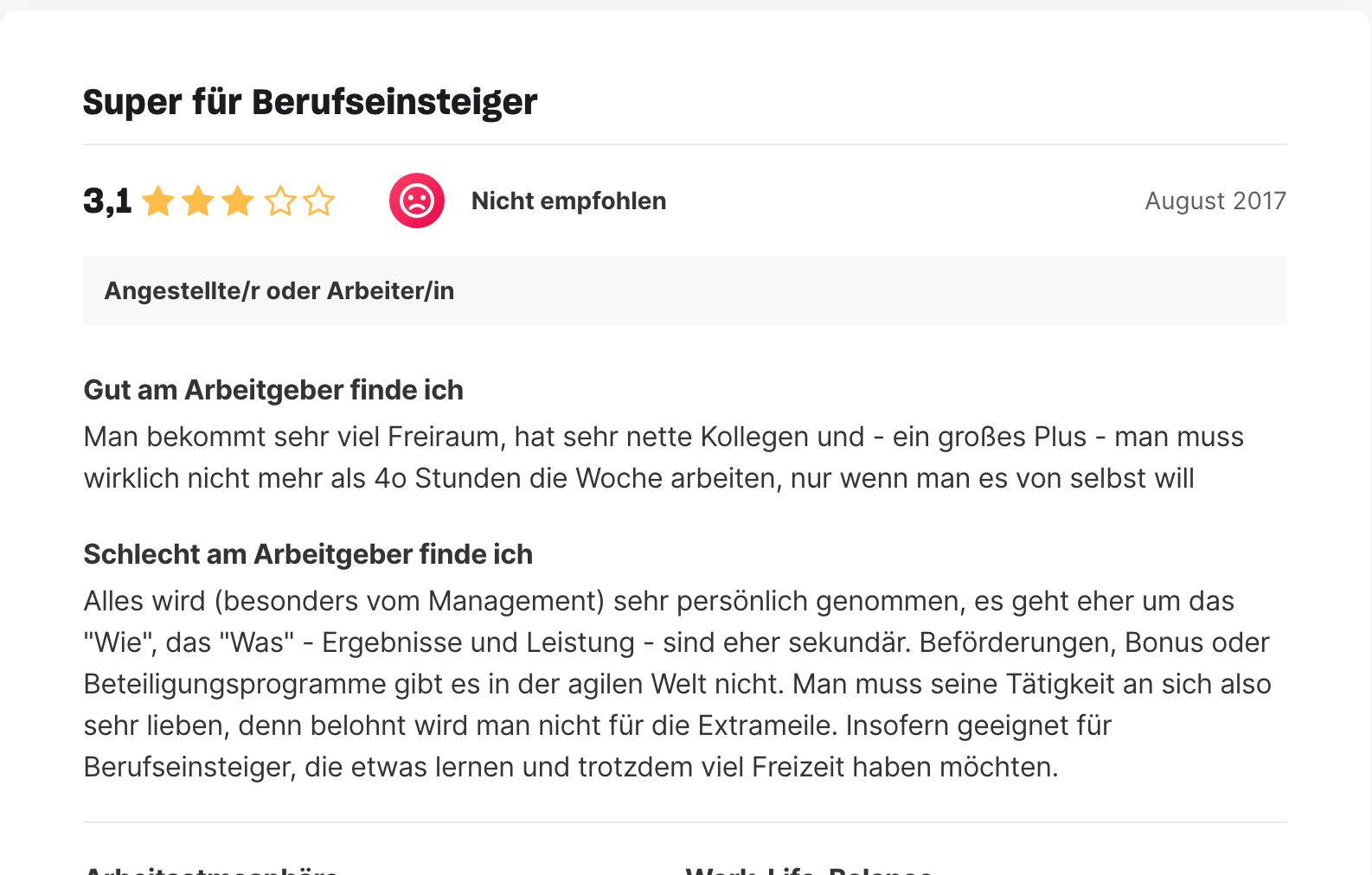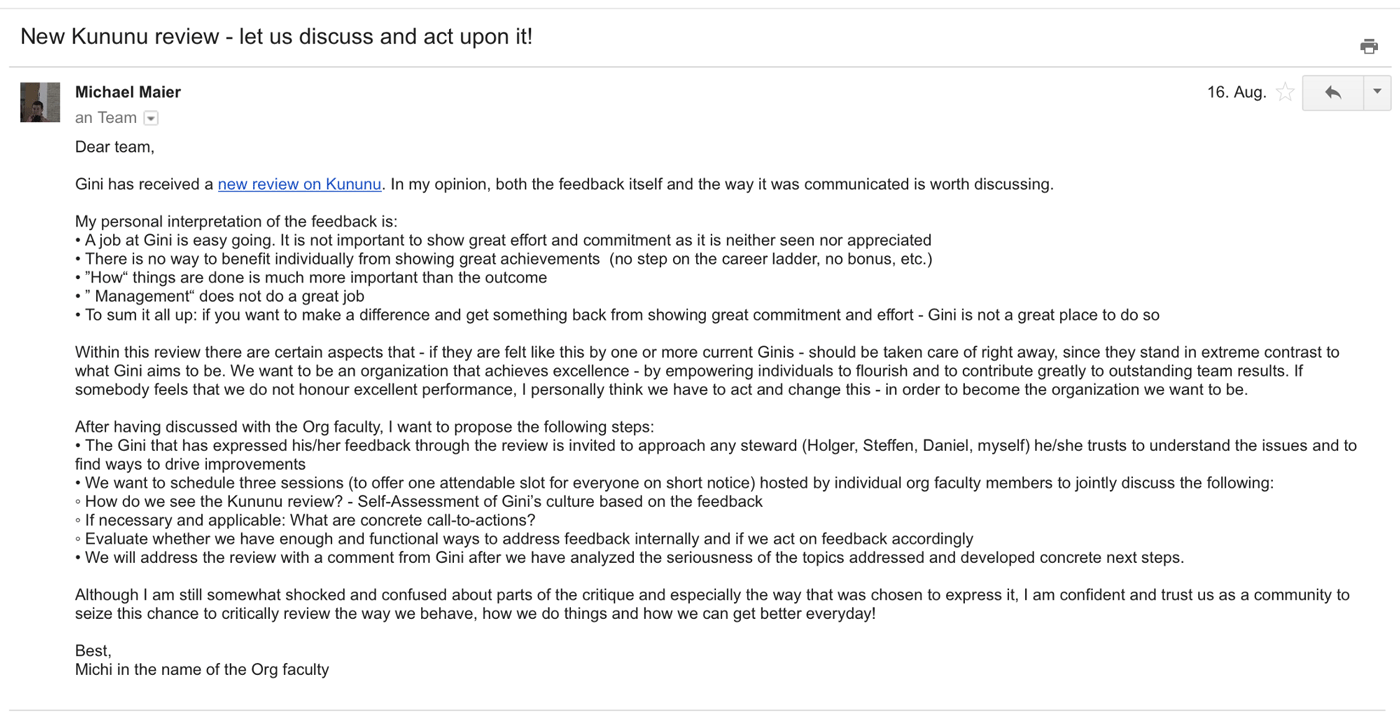We received a negative and painful review on Kununu. We asked ourselves — where do we truly stand with our culture? Are we living in a bubble full of self-praise?
It hit us. Hard. We had been investing a huge amount of time and energy into building an outstanding culture over the past years. We studied numerous examples of truly great businesses, dived deep into radically new organization styles and “the future of work”, and formed the “Org Faculty” that consists of five Ginis who drive the organizational development. Little by little, we have come up with our own, tailormade solution for the ideal Gini structure. Our biggest shift was in January 2017, when we adopted principles of self-organization. We have questioned everything and anything about how traditional companies run their business — with the goal of creating an outstanding environment and happy employees that love what they do. We have done self-assessments to see how far we have come — and received almost too good to be true scores on the cultural progress.
And now this.

Screenshot of the rating. The original review is not available anymore.
“Normal” companies get tons of mixed reviews on assessment websites. But firstly, we never wanted to be a normal company. And secondly, when everything you do is motivated by one bigger purpose, and after coming a very long way you’re suddenly testified you didn’t achieve much of your goal, it feels devastating. In a nutshell, the review — supposedly written by a current employee — argues (in our interpretation):
- Gini is good for young professionals and people at the beginning of their career, but only for them
- Leadership is poor, takes everything personally and measures work results only according to their subjective preferences
- Great performance isn’t rewarded and going the extra-mile isn’t worth it — there’s no chance to progress as an individual
- We’re a bunch of nice people, but with super low ambition.
With “excellence” being one of our four core values, that doesn’t go down well!
What We Did
After the first shock, we wondered what to do with such a review. Also, I must confess that we were quite angry that this feedback, being given to us for the very first time, was chosen to be expressed publicly. But how shall we take it from here? Was this the real image of how our culture was looking under the hood, or just one individual’s perception? Did we completely overlook this anger and unhappiness in our colleagues? Did we just imagine all the progress we had made?
In order to find out, we wanted to hear the truth. We sent out an e-mail to the team (see the e-mail below) on the first working day after the review had been posted. We suggested that the person who wrote the comment might want to approach one steward of their choice (“steward” is our terminology for a mix between coach and people manager), although we of course knew chances were slim somebody would reveal their identity if they didn’t feel the trust to address the matter before. We also initiated a team-wide discussion to analyze the mentioned critique. In order to speed up things we offered three separate working sessions within one week (a team-wide meeting suiting everyone’s calendar would have taken weeks of notice).

The team email to investigate and reflect
We would then pull together the insights and perspectives from the three sessions and get a clearer picture of how messy things really are — and hopefully be able to derive actions to tackle them.
Looking under the hood
In each of the working sessions, we wanted to know from Ginis:
- What elements of the review do they agree with?
- What needs to be improved?
- What do they perceive differently than the feedback giver?
- How did the team perceive the way the feedback had been given?
In general, the sessions were a big relief (see photos of the session’s notes here). Many colleagues were just as stunned as we were about the review, and plenty of the positive views that had been shared in the recent past have been reinforced. However, we also learnt that some of the mentioned aspects indeed need to be addressed. Our key insights were:
- Rewards for great performance are lacking. Since we don’t have titles or a conventional career ladder one can climb, high performing people miss seeing their progress (we started an internal project to address this issue two months ago, but work is still in progress).
- Transparency for certain compensation elements is missing (mainly the stock option program). While we have given out shares to individual employees, not everybody knows that this option exists — which we should be more transparent about.
- Our organization and culture needs to be explained even more thoroughly to candidates and new employees. Since the way we collaborate is different to what most people have experienced, we should spend even greater care in pointing out the specialties — both in interviews and when welcoming new colleagues.
Aside of things we need to improve, we also registered that our culture is one that polarizes — and that we’re actually perfectly fine with it. For example, “how” we do things is indeed super important for us. With “love” being one of our four core values, we care a lot about how people treat each other and the way we collaborate. Self-organization and wholeness imply that colleagues have to be authentic and loving in order to prosper in our environment — or they will not fit.
Feedback-Kanal
We also wanted to know how others felt about the public forum that had been chosen as a channel to communicate with us. Unanimously, Ginis taking part in the working sessions (about ⅔ of us) could not find an understanding for posting the critique on the Kununu website. We discussed the multiple feedback options we currently have — from our weekly, anonymous “Gini Pulse” mood board to direct face-to-face feedback or regular one-on-ones with a steward, peer feedback with colleagues and monthly team exchanges — and everyone found the “public blaming” to be especially surprising for the kind of organization we are. Some even doubted it had been written by a current colleague, since anybody can write a review and state he is a current or ex-employee — but that will forever remain a mystery.
Rechenschaftspflicht zur Verbesserung
“We are eager to continuously learn and improve — both as individuals and as a team.” This descriptive sentence of our core value “excellence” (see details in our handbook) highlights that we want to treat every setback as an opportunity to get better. We will therefore make ourselves accountable to improving on the areas mentioned before — and to showing significant results within six months (more precisely, until end of March, 2018). You can expect to read more about the improvements on this blog. By doing so, we will hopefully ensure that in the future, not even a single Gini — as long as he or she consciously chose our organization and culture — will ever feel so disappointed that the only way to address it is a public review.
Let’s get to work!
At Gini, we want our posts, articles, guides, white papers and press releases to reach everyone. Therefore, we emphasize that both female, male, and other gender identities are explicitly addressed in them. All references to persons refer to all genders, even when the generic masculine is used in content.





